2010年四六级听力备考:多积累多练习
- 格式:doc
- 大小:29.00 KB
- 文档页数:3
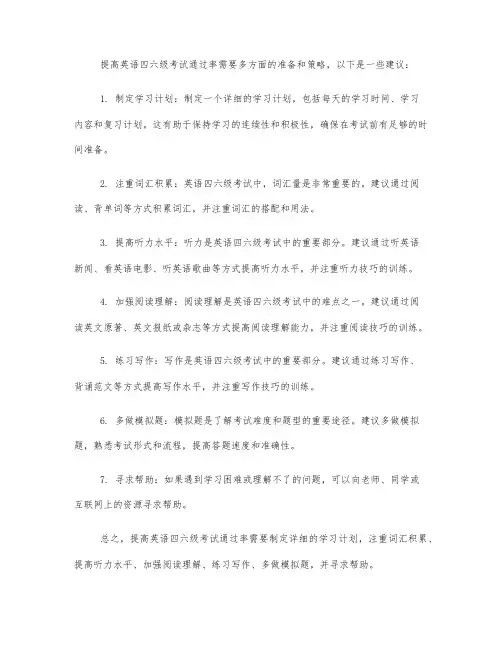
提高英语四六级考试通过率需要多方面的准备和策略,以下是一些建议:
1. 制定学习计划:制定一个详细的学习计划,包括每天的学习时间、学习
内容和复习计划。
这有助于保持学习的连续性和积极性,确保在考试前有足够的时间准备。
2. 注重词汇积累:英语四六级考试中,词汇量是非常重要的。
建议通过阅读、背单词等方式积累词汇,并注重词汇的搭配和用法。
3. 提高听力水平:听力是英语四六级考试中的重要部分。
建议通过听英语
新闻、看英语电影、听英语歌曲等方式提高听力水平,并注重听力技巧的训练。
4. 加强阅读理解:阅读理解是英语四六级考试中的难点之一。
建议通过阅
读英文原著、英文报纸或杂志等方式提高阅读理解能力,并注重阅读技巧的训练。
5. 练习写作:写作是英语四六级考试中的重要部分。
建议通过练习写作、
背诵范文等方式提高写作水平,并注重写作技巧的训练。
6. 多做模拟题:模拟题是了解考试难度和题型的重要途径。
建议多做模拟题,熟悉考试形式和流程,提高答题速度和准确性。
7. 寻求帮助:如果遇到学习困难或理解不了的问题,可以向老师、同学或
互联网上的资源寻求帮助。
总之,提高英语四六级考试通过率需要制定详细的学习计划,注重词汇积累、提高听力水平、加强阅读理解、练习写作、多做模拟题,并寻求帮助。
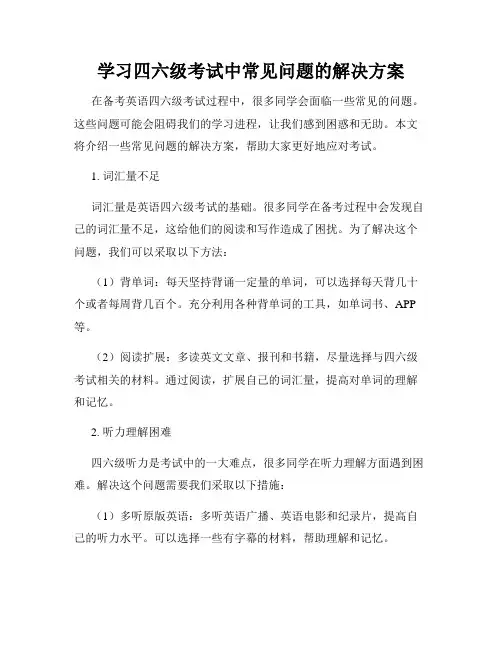
学习四六级考试中常见问题的解决方案在备考英语四六级考试过程中,很多同学会面临一些常见的问题。
这些问题可能会阻碍我们的学习进程,让我们感到困惑和无助。
本文将介绍一些常见问题的解决方案,帮助大家更好地应对考试。
1. 词汇量不足词汇量是英语四六级考试的基础。
很多同学在备考过程中会发现自己的词汇量不足,这给他们的阅读和写作造成了困扰。
为了解决这个问题,我们可以采取以下方法:(1)背单词:每天坚持背诵一定量的单词,可以选择每天背几十个或者每周背几百个。
充分利用各种背单词的工具,如单词书、APP 等。
(2)阅读扩展:多读英文文章、报刊和书籍,尽量选择与四六级考试相关的材料。
通过阅读,扩展自己的词汇量,提高对单词的理解和记忆。
2. 听力理解困难四六级听力是考试中的一大难点,很多同学在听力理解方面遇到困难。
解决这个问题需要我们采取以下措施:(1)多听原版英语:多听英语广播、英语电影和纪录片,提高自己的听力水平。
可以选择一些有字幕的材料,帮助理解和记忆。
(2)模拟听力练习:多做一些听力练习题,加强对听力材料的理解。
可以找一些真题进行模拟,熟悉考试的题型和难度。
3. 写作表达不准确写作是英语四六级考试中的一项重要内容,但很多同学在写作表达方面存在一些问题。
为了提高写作水平,可以采取以下方法:(1)模仿范文:多看一些范文,了解一些常用的表达方式和句型。
通过模仿范文,学习如何合理组织和表达自己的观点。
(2)多练习写作:每周选择一个写作题目进行练习,可以请教老师或者朋友帮忙修改和指导。
通过不断练习,提高自己的写作能力。
4. 阅读理解困难阅读理解是四六级考试中的一项重要内容,但很多同学在阅读理解方面存在困难。
为了解决这个问题,我们可以采取以下方法:(1)学会略读和精读:在解决题目之前,先快速浏览全文,了解文章的大意和结构。
然后再细读文章,仔细理解每一段的内容。
(2)积累阅读素材:平时多读一些英文文章和书籍,积累阅读素材。
可以选择一些经典的英文材料,如《纽约时报》、《经济学人》等。
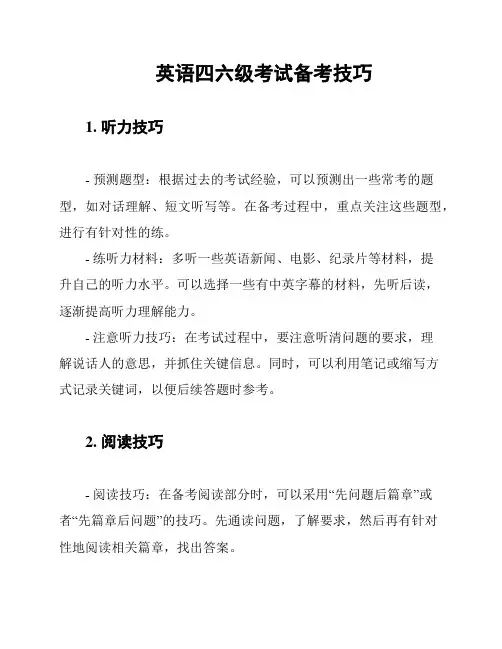
英语四六级考试备考技巧1. 听力技巧- 预测题型:根据过去的考试经验,可以预测出一些常考的题型,如对话理解、短文听写等。
在备考过程中,重点关注这些题型,进行有针对性的练。
- 练听力材料:多听一些英语新闻、电影、纪录片等材料,提升自己的听力水平。
可以选择一些有中英字幕的材料,先听后读,逐渐提高听力理解能力。
- 注意听力技巧:在考试过程中,要注意听清问题的要求,理解说话人的意思,并抓住关键信息。
同时,可以利用笔记或缩写方式记录关键词,以便后续答题时参考。
2. 阅读技巧- 阅读技巧:在备考阅读部分时,可以采用“先问题后篇章”或者“先篇章后问题”的技巧。
先通读问题,了解要求,然后再有针对性地阅读相关篇章,找出答案。
- 提高词汇量:英语四六级考试中,词汇量的积累非常重要。
平时可以多背单词,扩大词汇量,并结合阅读练,提高对词汇的理解和运用能力。
- 预测文章结构:阅读文章时,尝试预测文章的结构,包括段落关系、主题句等。
这样可以更好地理解文章的逻辑,在答题时能够更快地找到相关信息。
3. 写作技巧- 练写作:在备考写作部分时,要多进行写作练。
可以选择一些常见的写作题目,进行模拟写作,提高写作表达能力。
- 注意文章结构:写作时,要注意文章的结构,包括引言、正文和结论。
合理安排段落,确保观点清晰,逻辑流畅。
- 提高词汇水平:写作中,尽量应用一些高级词汇和短语,提升语言表达的水平。
同时,要注意语法和拼写的准确性。
4. 翻译技巧- 提前积累词汇:翻译部分的备考中,积累词汇是必不可少的。
事先准备一份常见词汇表,并进行词汇记忆和使用练。
- 练翻译句子:运用翻译工具,选择一些句子进行翻译练。
可以从简单的句子开始,逐渐提高难度,培养翻译能力。
- 阅读翻译资料:在备考过程中,可以多阅读一些翻译资料,了解一些翻译技巧和常见的翻译问题。
同时,注重词语和句子的转换方式,提升翻译准确度。
以上是备考英语四六级考试的技巧,希望能对您有所帮助。
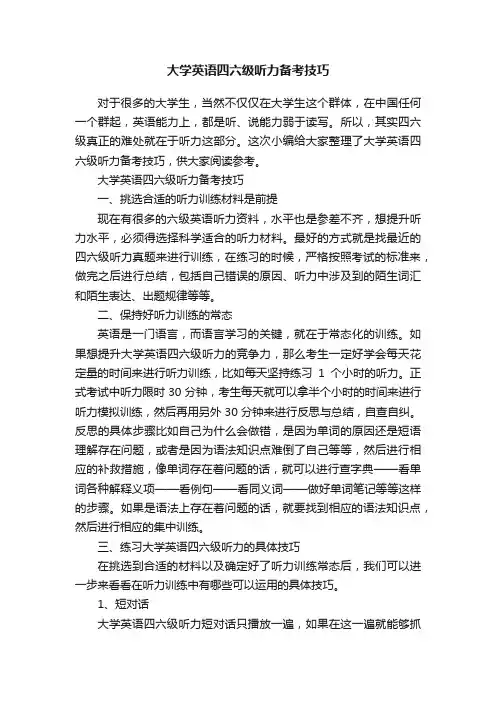
大学英语四六级听力备考技巧对于很多的大学生,当然不仅仅在大学生这个群体,在中国任何一个群起,英语能力上,都是听、说能力弱于读写。
所以,其实四六级真正的难处就在于听力这部分。
这次小编给大家整理了大学英语四六级听力备考技巧,供大家阅读参考。
大学英语四六级听力备考技巧一、挑选合适的听力训练材料是前提现在有很多的六级英语听力资料,水平也是参差不齐,想提升听力水平,必须得选择科学适合的听力材料。
最好的方式就是找最近的四六级听力真题来进行训练,在练习的时候,严格按照考试的标准来,做完之后进行总结,包括自己错误的原因、听力中涉及到的陌生词汇和陌生表达、出题规律等等。
二、保持好听力训练的常态英语是一门语言,而语言学习的关键,就在于常态化的训练。
如果想提升大学英语四六级听力的竞争力,那么考生一定好学会每天花定量的时间来进行听力训练,比如每天坚持练习1个小时的听力。
正式考试中听力限时30分钟,考生每天就可以拿半个小时的时间来进行听力模拟训练,然后再用另外30分钟来进行反思与总结,自查自纠。
反思的具体步骤比如自己为什么会做错,是因为单词的原因还是短语理解存在问题,或者是因为语法知识点难倒了自己等等,然后进行相应的补救措施,像单词存在着问题的话,就可以进行查字典——看单词各种解释义项——看例句——看同义词——做好单词笔记等等这样的步骤。
如果是语法上存在着问题的话,就要找到相应的语法知识点,然后进行相应的集中训练。
三、练习大学英语四六级听力的具体技巧在挑选到合适的材料以及确定好了听力训练常态后,我们可以进一步来看看在听力训练中有哪些可以运用的具体技巧。
1、短对话大学英语四六级听力短对话只播放一遍,如果在这一遍就能够抓到足够多的信息并筛选出正确的答案呢?准确率最高的一种方式就是先大致浏览下答案选项,然后在听的过程中注重对于短对话的整体理解,千万不要听到什么选什么,因为这有可能就是陷阱,有可能被偷换了主语或者概念。
一般来说,在听力短对话这部分,答案基本上都是需要进行同义替换的。
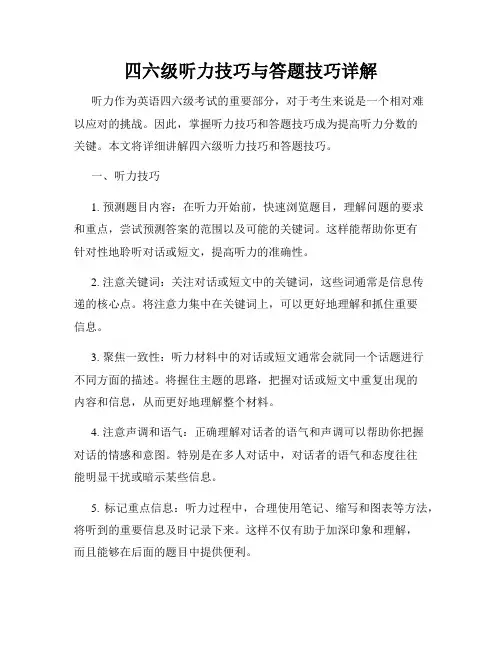
四六级听力技巧与答题技巧详解听力作为英语四六级考试的重要部分,对于考生来说是一个相对难以应对的挑战。
因此,掌握听力技巧和答题技巧成为提高听力分数的关键。
本文将详细讲解四六级听力技巧和答题技巧。
一、听力技巧1. 预测题目内容:在听力开始前,快速浏览题目,理解问题的要求和重点,尝试预测答案的范围以及可能的关键词。
这样能帮助你更有针对性地聆听对话或短文,提高听力的准确性。
2. 注意关键词:关注对话或短文中的关键词,这些词通常是信息传递的核心点。
将注意力集中在关键词上,可以更好地理解和抓住重要信息。
3. 聚焦一致性:听力材料中的对话或短文通常会就同一个话题进行不同方面的描述。
将握住主题的思路,把握对话或短文中重复出现的内容和信息,从而更好地理解整个材料。
4. 注意声调和语气:正确理解对话者的语气和声调可以帮助你把握对话的情感和意图。
特别是在多人对话中,对话者的语气和态度往往能明显干扰或暗示某些信息。
5. 标记重点信息:听力过程中,合理使用笔记、缩写和图表等方法,将听到的重要信息及时记录下来。
这样不仅有助于加深印象和理解,而且能够在后面的题目中提供便利。
二、答题技巧1. 利用选项消减法:在选择题中,单选和多选题通常提供几个选项。
利用所学的听力技巧,将不符合条件的选项逐一排除,最终选出正确答案。
这样可以提高选择题的答题准确性。
2. 注意选项词序:很多听力选项的干扰性在于选项词的词序和原文不一致。
在做题过程中,注意选项词的变化和顺序,避免由于这种干扰导致选项选择错误。
3. 捕捉细节信息:许多听力题目要求考生拾取细节信息。
在听力过程中,注意捕捉细节信息的同时,确保不丢失整体大意。
4. 注意时间提示:听力材料中经常会提到具体的时间信息,例如日期、时间段等。
捕捉这些信息并在答题时有效利用,有助于提高答题的准确度。
5. 学会揣测答案:有时候,无法听清或者无法确定答案的情况下,可以学会根据前后文的逻辑关系和常识进行揣测。
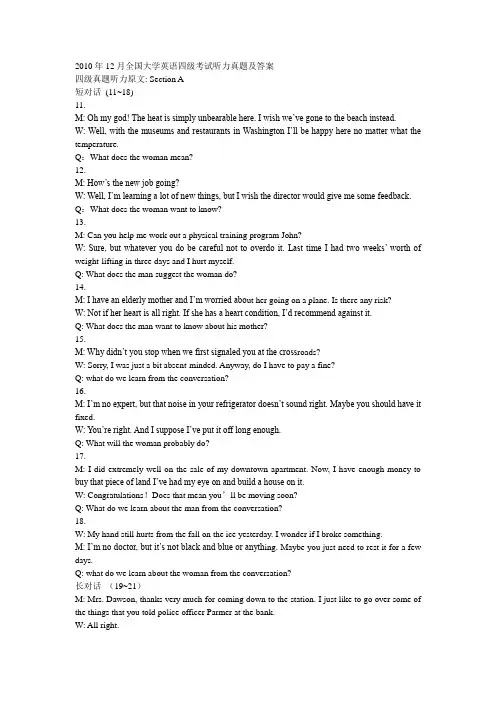
2010年12月全国大学英语四级考试听力真题及答案四级真题听力原文: Section A短对话(11~18)11.M: Oh my god! The heat is simply unbearable here. I wish we’ve gone to the beach instead.W: Well, with the museums and restaurants in Washington I’ll be happy here no matter what the temperature.Q:What does the woman mean?12.M: How’s the new job going?W: Well, I’m learning a lot of new things, but I wish the director would give me some feedback. Q:What does the woman want to know?13.M: Can you help me work out a physical training program John?W: Sure, but whatever you do be careful not to overdo it. Last time I had two weeks’ worth of weight-lifting in three days and I hurt myself.Q: What does the man suggest the woman do?14.M: I have an elderly mother and I’m worried abo ut her going on a plane. Is there any risk?W: Not if her heart is all right. If she has a heart condition, I’d recommend against it.Q: What does the man want to know about his mother?15.M: Why didn’t you stop when we first signaled you at the cross roads?W: Sorry, I was just a bit absent-minded. Anyway, do I have to pay a fine?Q: what do we learn from the conversation?16.M: I’m no expert, but that noise in your refrigerator doesn’t sound right. Maybe you should have it fixed.W: You’re right. And I suppose I’ve put it off long enough.Q: What will the woman probably do?17.M: I did extremely well on the sale of my downtown apartment. Now, I have enough money to buy that piece of land I’ve had my eye on and build a house on it.W: Congratulations!Does that mean you’ll be moving soon?Q: What do we learn about the man from the conversation?18.W: My hand still hurts from the fall on the ice yesterday. I wonder if I broke something.M: I’m no doctor, but it’s not black and blue or anyth ing. Maybe you just need to rest it for a few days.Q: what do we learn about the woman from the conversation?长对话(19~21)M: Mrs. Dawson, thanks very much for coming down to the station. I just like to go over some of the things that you told police officer Parmer at the bank.W: All right.M: Well, could you describe the man who robbed the bank for this report that we’re filling out here? Now, anything at all that you can remember would be extremely helpful to us.W: Well, just, I can only remember basically what I said before.M: That’s all right.W: The man was tall, six foot, and he had dark hair, and he had moustache.M: Very good. All right, did he have any other distinguishing marks?W: Um, no, none that I can remember.M: Do you remember how old he was by any chance?W: Well, I guess around 30, maybe younger, give or take a few years.M: Mm, all right. Do you remember anything about what he was wearing?W: Yes, yes, he had on a dark sweater, a solid color.M: OK. Um, anything else that strikes you at the moment?W: I remember he was wearing a light shirt under the sweater. Yes, yes.M: All right. Mrs. Dawson, I really appreciate what you’ve been through today. I’m just going to ask you to look at some photographs before you leave if y ou don’t mind. It won’t take very long. Can you do that for me?W: Oh, of course.M: Would you like to step this way with me, please?W: OK, sure.M: Thank you.Questions 19 to 21 are based on the conversation you have just heard.19. What do we learn about the woman?20. What did the suspect look like?21. What did the man finally asked the woman to do?长对话(22~25)W: Good morning, I’m calling about the job that was in the paper last night.M: Well, could you tell me your name?W: Candidate Foreset.M: Oh yes. What exactly is it that interests you about the job?W: Well, I thought it was just right for me.M: Really? Um… Could you tell me a little about yourself?W: Yes. I’m 23. I’ve been working abroad.M: Where exactly have you been working?W: In Geneva.M: Oh, Geneva. And what were you doing there?W: Secretarial work. Previous to that, I was at university.M: Which university was that?W: The University of Manchester. I’ve got a degree in English.M: You said you’ve been working i n Geneva. Do you have any special reason for wanting to come back?W: I thought it would be nice to be near to the family.M: I see, and how do you see yourself developing in this job?W: Well, I’m ambitious. I do hope that my career as a secretary will lead me eventually into management.M: I see. You have foreign languages?W: French and Italian.M: Well, I think the best thing for you to do is do reply a writing to the advertisement.W: Can’t I arrange for an interview now?M: Well, I’m afraid we must wait until all the applications are in, in writing, and then decide on the short list. If you are on the short list, of course we should see you.W: Oh, I see.M: I look forward to receiving your application in writing in a day or two.W: Oh, yes, yes, certainly.M: Ok, thank you very much. Goodbye.W: Thank you. Goodbye.Questions 22 to 25 are based on the conversation you have just heard.22. How did the woman get to know about the job vacancy?23. Why did the woman find the job appealing?24. What had the woman been doing in Geneva?25. What was the woman asked to do in the end?Section BPassage OneOne of the greatest heartbreaks for fire fighters occurs when they fail to rescue a child from a burning building because the child, frightened by smoke and noise, hides under a bed or in a closet and is later found dead. Saddest of all is when children catch a glimpse of the masked the fire fighter but hide because they think they have seen a monster. To prevent such tragedies, fire fighter Eric Velez gives talks to children in his community, explaining that they should never hide during a fire. He displays fire fighters’ equipment, including the oxygen mask, which he encourages his listeners to play with and put on. “If you see us,” Velez tells them, “don’t hide! We are not monsters. We have come to rescue you.” Velez gives his presentations in English and Spanish. Growing up in San Francisco, he learnt Spanish from his immigrant parents. Velez and other fire fighters throughout North America, who give similar presentations, will never know how many lives they save through their talks. But it’s a fact that informative speaking saves lives. For example, several months after listening to an informative speech, Pete Gentry in North Carolina rescued his brother who is choking on food, by using the method taught by student speaker, Julie Paris. In addition to saving lives, informative speakers help people learn new skills, solve problems and acquire fascinating facts about the exciting world in which they live.26 Why do some children trapped in a burning building hide from masked fire fighters?27 What does the passage tell us about fire fighter Eric Velez?28 What do we learn about Pete Gentry?29 What message is the speaker trying to convey?Passage TwoSome people want to make and save a lot of money in order to retire early. I see people pursuing higher paying and increasingly demanding careers to accomplish this goal. They make many personal sacrifices in exchange for income today. The problem is that tomorrow might not come. Even if it all goes according to plan, will you know how to be happy when you are not working if you spend your entire life making money? More importantly, who will be around for you to share your leisure time with? At the other extreme are people who live only for today. Why bothersaving when I might not be here tomorrow, they argue. The danger of this approach is that tomorrow may come after all. And most people don't want to spend all their tomorrows working for a living. The earlier neglect of saving, however, makes it difficult not to work when you are older. You maybe surprise to hear me say that if you must pick an extreme I think it's better to pick the spend-all approach. As long as you don't mind continuing to work, assuming your health allows, you should be OK. At least, you are making use of your money, and hopefully deriving value and pleasure from it. Postponing doing what you love and being with people you love until retirement can be a mistake. It may never come. Retirement can be a great time for some people. For others, it is a time of boredom, loneliness and poor health.30 Why do some people pursue higher paying but demanding careers?31 What is the danger facing people who live only for today?32 What does the speaker seem to advocate?Passage ThreeImagine that someone in your neighborhood broke the law, and the judge put the whole neighborhood under suspicion. How fair will that be? Well, it happens everyday to high schoolers. Just because some students have stolen things in shops, all of us are treated like thieves. Even though I’d never steal.Store employees looked at me like I’m some kind of hardened criminal. For example, during one lunch period, my friend Denny and I went to the Graben Gore Restaurant to have a hot dog. We arrived to find a line of students waiting outside. A new sign in the window told the story. “No more than two students at a time”. After 15 minutes, we finally got in. But the store manger laid the evil eye on us. I ask ed him about the new sign, and he said, “You kids are stealing too much stuff.” You kids? Too much stuff? We were not only assumed to be thieves, but brilliant, greedy thieves. The most annoying thing though, is the way employees watched my friends and me. It’s horrible.Once, at a drug store, I was looking around and found a guy standing on a large box, stocking the shelves. He was watching my hands, more than he was watching his own. I showed him that my hands were empty. He got down off his box and rushed off, as if he was going to get the store manger. How crazy is that!33. What does the speaker find to be unfair?34. What measure did the Graben Gore Restaurant take to stop stealing?35. What happened in a drug store that greatly annoyed the speaker?Section CWriting keeps us in touch with other people. We write to communicate with relatives and friends. We write to preserve our family histories so our children and grandchildren can learn and appreciate their heritage. With computers and Internet connections in so many households, colleges, and businesses, people are e-mailing friends and relatives all the time -- or talking to them in writing in online chat rooms. It is cheaper than calling long distance, and a lot more convenient than waiting until Sunday for the telephone rates to drop. Students are e-mailing their professors to receive and discuss their classroom assignments and to submit them. They are e-mailing classmates to discuss and collaborate on homework. They are also sharing information about concerts and sports events, as well as jokes and their philosophies of life.Despite the growing importance of computers, however, there will always be a place and need for the personal letter. A hand-written note to a friend or a family member is the best way tocommunicate important thoughts. No matter what the content of the message, its real point is, "I want you to know that I care about you." This writing practice brings rewards that can’t be seen in bank accounts, but only in the success of human relationships.2011年12月四级听力选择题答案北京新东方学校国内部欧阳萍11.C)She enjoys staying in Washington。
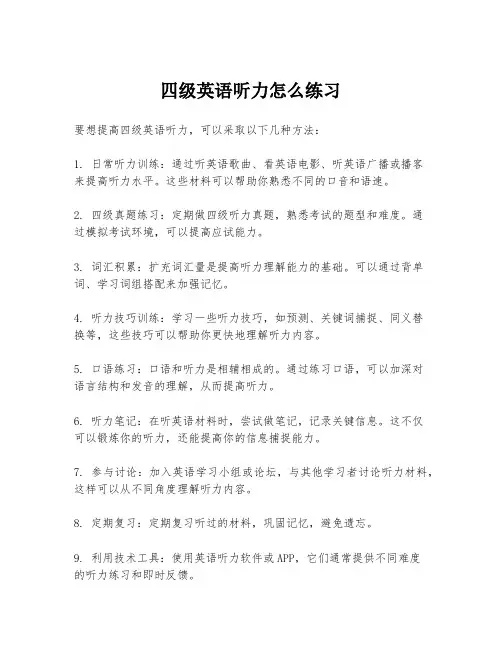
四级英语听力怎么练习
要想提高四级英语听力,可以采取以下几种方法:
1. 日常听力训练:通过听英语歌曲、看英语电影、听英语广播或播客
来提高听力水平。
这些材料可以帮助你熟悉不同的口音和语速。
2. 四级真题练习:定期做四级听力真题,熟悉考试的题型和难度。
通
过模拟考试环境,可以提高应试能力。
3. 词汇积累:扩充词汇量是提高听力理解能力的基础。
可以通过背单词、学习词组搭配来加强记忆。
4. 听力技巧训练:学习一些听力技巧,如预测、关键词捕捉、同义替
换等,这些技巧可以帮助你更快地理解听力内容。
5. 口语练习:口语和听力是相辅相成的。
通过练习口语,可以加深对
语言结构和发音的理解,从而提高听力。
6. 听力笔记:在听英语材料时,尝试做笔记,记录关键信息。
这不仅
可以锻炼你的听力,还能提高你的信息捕捉能力。
7. 参与讨论:加入英语学习小组或论坛,与其他学习者讨论听力材料,这样可以从不同角度理解听力内容。
8. 定期复习:定期复习听过的材料,巩固记忆,避免遗忘。
9. 利用技术工具:使用英语听力软件或APP,它们通常提供不同难度
的听力练习和即时反馈。
10. 保持耐心和持续性:提高听力是一个渐进的过程,需要耐心和持续的努力。
不要因为一时的困难而放弃。
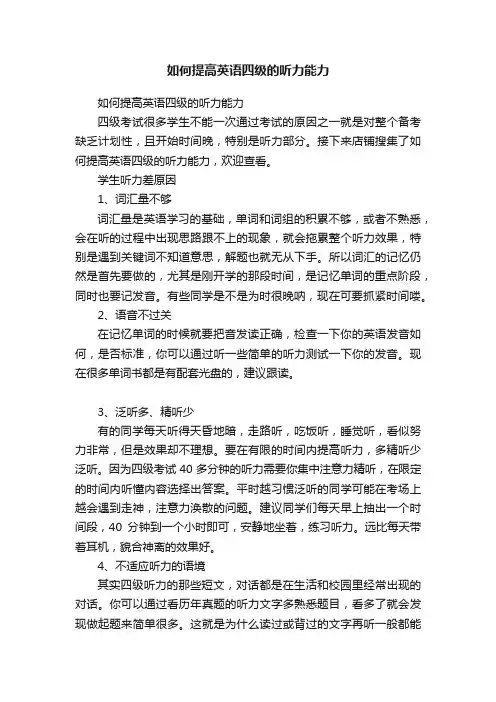
如何提高英语四级的听力能力如何提高英语四级的听力能力四级考试很多学生不能一次通过考试的原因之一就是对整个备考缺乏计划性,且开始时间晚,特别是听力部分。
接下来店铺搜集了如何提高英语四级的听力能力,欢迎查看。
学生听力差原因1、词汇量不够词汇量是英语学习的基础,单词和词组的积累不够,或者不熟悉,会在听的过程中出现思路跟不上的现象,就会拖累整个听力效果,特别是遇到关键词不知道意思,解题也就无从下手。
所以词汇的记忆仍然是首先要做的,尤其是刚开学的那段时间,是记忆单词的重点阶段,同时也要记发音。
有些同学是不是为时很晚呐,现在可要抓紧时间喽。
2、语音不过关在记忆单词的时候就要把音发读正确,检查一下你的英语发音如何,是否标准,你可以通过听一些简单的听力测试一下你的发音。
现在很多单词书都是有配套光盘的,建议跟读。
3、泛听多、精听少有的同学每天听得天昏地暗,走路听,吃饭听,睡觉听,看似努力非常,但是效果却不理想。
要在有限的时间内提高听力,多精听少泛听。
因为四级考试40多分钟的听力需要你集中注意力精听,在限定的时间内听懂内容选择出答案。
平时越习惯泛听的同学可能在考场上越会遇到走神,注意力涣散的问题。
建议同学们每天早上抽出一个时间段,40分钟到一个小时即可,安静地坐着,练习听力。
远比每天带着耳机,貌合神离的效果好。
4、不适应听力的语境其实四级听力的那些短文,对话都是在生活和校园里经常出现的对话。
你可以通过看历年真题的听力文字多熟悉题目,看多了就会发现做起题来简单很多。
这就是为什么读过或背过的文字再听一般都能听懂。
5、对文化背景和常用短语不熟悉英文口语中有很多口语化的词汇是英语课本中没见过的,但是在听力中经常出现,这就要求你要积极一点,多积累一些,最起码应该把历年真题中出现的口语化语言积累起来,方便记忆。
建议你在学习词汇时要边听边记,开始认识词汇时就要把发音把握好,同时在做听力练习时,尤其在精听时要仔细听一下每个单词的发音,体会一下英美发音的不同。
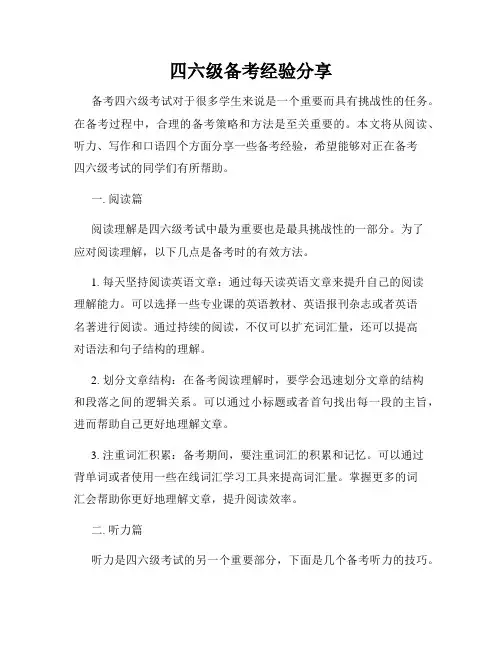
四六级备考经验分享备考四六级考试对于很多学生来说是一个重要而具有挑战性的任务。
在备考过程中,合理的备考策略和方法是至关重要的。
本文将从阅读、听力、写作和口语四个方面分享一些备考经验,希望能够对正在备考四六级考试的同学们有所帮助。
一. 阅读篇阅读理解是四六级考试中最为重要也是最具挑战性的一部分。
为了应对阅读理解,以下几点是备考时的有效方法。
1. 每天坚持阅读英语文章:通过每天读英语文章来提升自己的阅读理解能力。
可以选择一些专业课的英语教材、英语报刊杂志或者英语名著进行阅读。
通过持续的阅读,不仅可以扩充词汇量,还可以提高对语法和句子结构的理解。
2. 划分文章结构:在备考阅读理解时,要学会迅速划分文章的结构和段落之间的逻辑关系。
可以通过小标题或者首句找出每一段的主旨,进而帮助自己更好地理解文章。
3. 注重词汇积累:备考期间,要注重词汇的积累和记忆。
可以通过背单词或者使用一些在线词汇学习工具来提高词汇量。
掌握更多的词汇会帮助你更好地理解文章,提升阅读效率。
二. 听力篇听力是四六级考试的另一个重要部分,下面是几个备考听力的技巧。
1. 多听多练:备考听力过程中,要多听各种不同题材和难度的听力材料。
可以选择听英语新闻、英语电影或者一些真题听力进行训练。
多听多练能够提高自己的听力水平和对不同口音的理解能力。
2. 提高听力速度:考试中听力材料的播放速度相对较快,因此需要提高自己的听力速度。
平时可以通过听慢速英语材料或者使用一些在线听力训练工具来提高听力速度和听得准确度。
3. 注意听力笔记:备考听力时,要注意在听的同时做好笔记。
可以用简洁的关键词和短语记录听到的信息,有助于理解材料和回答相关问题。
三. 写作篇写作是四六级考试中另一个重要的部分,以下是备考写作的几个方法。
1. 多写作文:备考写作最有效的方法就是多写作文。
可以选择一些热门话题或者近期发生的事件进行写作练习。
通过不断练习,可以提高自己的写作能力和写作速度。
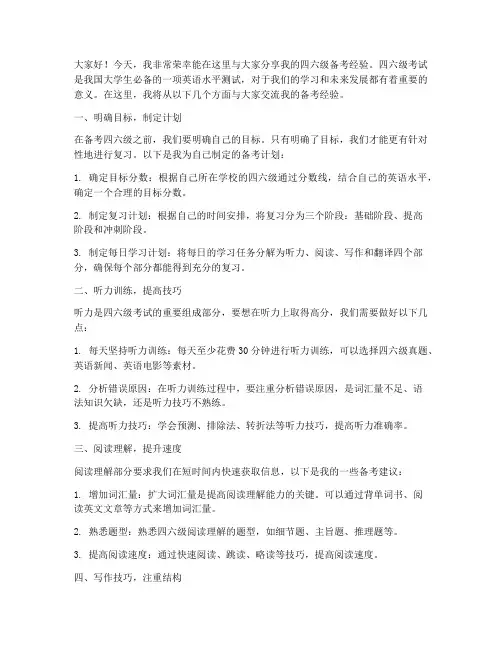
大家好!今天,我非常荣幸能在这里与大家分享我的四六级备考经验。
四六级考试是我国大学生必备的一项英语水平测试,对于我们的学习和未来发展都有着重要的意义。
在这里,我将从以下几个方面与大家交流我的备考经验。
一、明确目标,制定计划在备考四六级之前,我们要明确自己的目标。
只有明确了目标,我们才能更有针对性地进行复习。
以下是我为自己制定的备考计划:1. 确定目标分数:根据自己所在学校的四六级通过分数线,结合自己的英语水平,确定一个合理的目标分数。
2. 制定复习计划:根据自己的时间安排,将复习分为三个阶段:基础阶段、提高阶段和冲刺阶段。
3. 制定每日学习计划:将每日的学习任务分解为听力、阅读、写作和翻译四个部分,确保每个部分都能得到充分的复习。
二、听力训练,提高技巧听力是四六级考试的重要组成部分,要想在听力上取得高分,我们需要做好以下几点:1. 每天坚持听力训练:每天至少花费30分钟进行听力训练,可以选择四六级真题、英语新闻、英语电影等素材。
2. 分析错误原因:在听力训练过程中,要注重分析错误原因,是词汇量不足、语法知识欠缺,还是听力技巧不熟练。
3. 提高听力技巧:学会预测、排除法、转折法等听力技巧,提高听力准确率。
三、阅读理解,提升速度阅读理解部分要求我们在短时间内快速获取信息,以下是我的一些备考建议:1. 增加词汇量:扩大词汇量是提高阅读理解能力的关键。
可以通过背单词书、阅读英文文章等方式来增加词汇量。
2. 熟悉题型:熟悉四六级阅读理解的题型,如细节题、主旨题、推理题等。
3. 提高阅读速度:通过快速阅读、跳读、略读等技巧,提高阅读速度。
四、写作技巧,注重结构写作部分要求我们在规定时间内完成一篇短文,以下是我的一些写作技巧:1. 熟悉写作模板:掌握常见的写作模板,如总分总、问题解决、对比等。
2. 注意文章结构:确保文章结构清晰,段落之间过渡自然。
3. 提高词汇和句型运用:在写作过程中,尽量使用高级词汇和复杂句型,提高文章质量。
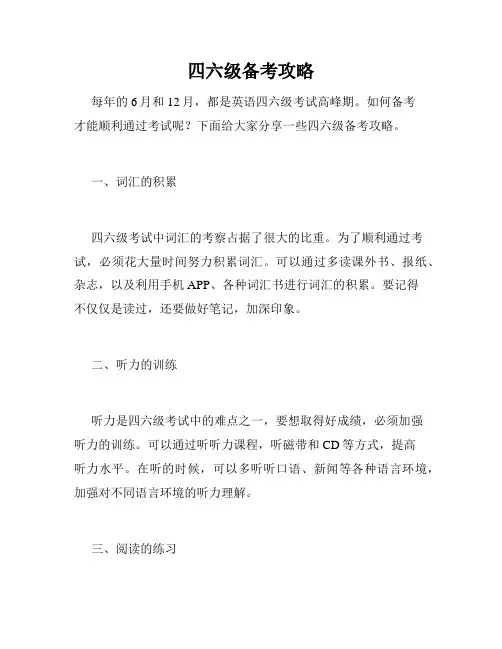
四六级备考攻略每年的6月和12月,都是英语四六级考试高峰期。
如何备考才能顺利通过考试呢?下面给大家分享一些四六级备考攻略。
一、词汇的积累四六级考试中词汇的考察占据了很大的比重。
为了顺利通过考试,必须花大量时间努力积累词汇。
可以通过多读课外书、报纸、杂志,以及利用手机APP、各种词汇书进行词汇的积累。
要记得不仅仅是读过,还要做好笔记,加深印象。
二、听力的训练听力是四六级考试中的难点之一,要想取得好成绩,必须加强听力的训练。
可以通过听听力课程,听磁带和CD等方式,提高听力水平。
在听的时候,可以多听听口语、新闻等各种语言环境,加强对不同语言环境的听力理解。
三、阅读的练习阅读是四六级考试中的另一难点,备考时也需要大量练习。
一方面需要加强阅读速度,另一方面也需要加强阅读理解能力。
可以通过多读英文原版书籍、报纸杂志等,同时还要做好笔记,梳理相关知识点,提高自己的阅读理解能力。
四、写作的技巧写作是四六级考试中不可忽视的一环。
可以通过多写短文、读范文以及写作练习等方式,提高自己的写作水平。
在写作时,需要注意语法和用词的准确性,同时还需要注重文章结构和思路的逻辑性。
五、模拟考试的重要性模拟考试是四六级备考过程中的重要环节。
可以通过模拟考试,了解自己的薄弱环节,并针对性地进行强化训练。
同时也可以提高自己的考试经验和应变能力,为考试做好充分准备。
六、复习计划的制定备考四六级的过程中,制定好复习计划是非常必要的。
可以根据自己的实际情况,制定出符合自己实际情况的复习计划,包括每天要学习的知识点和复习内容,以及时间安排等方面。
同时还应该确保自己有足够的时间来进行复习和训练,尤其是在考试前的最后一段时间,更要加大复习投入力度。
以上是备考四六级的一些攻略建议,希望能够对大家有所帮助。
只要刻苦努力,把握好上述几点,相信就能够顺利通过四六级考试。
四六级听力考试练习的五个有效方法考试紧张,听力部分更是让众多考生感到头疼。
要提高听力水平,充分利用练习是非常重要的。
本文将为大家介绍四六级听力考试练习的五个有效方法。
一、多听真题多听真题是提高听力水平的必备方法。
可以通过购买历年真题的录音或借阅相关教材,每天挑选一篇进行听力训练。
这样可以熟悉考试的题型和难度,并在实践中寻找突破口。
通过多次练习,掌握常规题型的解题技巧,提高听力反应速度。
二、积累词汇四六级听力考试中,词汇是通过听力材料理解和解答问题的基石。
因此,积累词汇是非常重要的。
可以通过背单词、阅读英语材料或听力材料等方式进行词汇积累。
同时,要善于总结和归纳,将学到的词汇进行分类整理,建立自己的词汇库。
三、注意细节四六级听力考试中,细节题是比较常见的题型。
为了应对这类题目,练习时应注意捕捉关键词、人物对话、数字、地点、时间等细节信息。
可以通过反复听和做听力题来提高对细节信息的把握能力,避免因小失大。
四、创造听力环境营造良好的听力环境是提高听力水平的重要手段。
可以通过听英语广播、音乐、跟读、看英语电影等方式来提升对英语语音的敏感度。
此外,参加英语角、找外教交流等活动也可以增加听力的实践机会,加深对各种语速和口音的理解。
五、练习笔记整理听力考试过程中,良好的记录和整理习惯是必不可少的。
可以在听力过程中做简略的笔记,把重要信息记录下来,以便后续解答问题。
同时,听完录音后,要及时整理笔记,将听到的内容整合成逻辑完整的句子或段落。
这样可以提高听力的记忆度和理解度。
综上所述,通过多听真题、积累词汇、注意细节、创造听力环境和练习笔记整理等五个方法,可以有效提高四六级听力考试的能力。
在备考期间,要持之以恒,坚持每天练习,不断完善听力技巧和策略,相信在考试中取得好成绩不再是难事。
希望以上方法能对大家的备考有所帮助,祝愿大家取得优异成绩!。
一、听力理解备考1.频繁听力练习:多听一些试题录音,包括听懂文章内容、理解文章目的和推理判断等方面的题目。
2.培养听力技巧:如辨音能力、快速听懂问题、运用上下文推断答案等。
3.寻找材料:找些听力材料和试题进行模拟训练,多模拟真实的考试场景。
二、阅读理解备考1.多读多练:多读各种故事、新闻、说明文等。
阅读不仅提高语言表达能力,还有助于培养理解力和推理能力。
2.理解细节:重点培养学生对细节的观察能力,训练细节辨析和记忆技巧。
3.分析文章结构:学习分析文章结构,从总分关系、目的方法等角度进行分析。
4.学习解题技巧:学习应对不同题型的解题技巧,如推理判断、主旨归纳等。
三、写作备考1.多写多练:培养孩子书写能力和表达能力,多写各类文体,如记叙文、议论文、说明文等。
2.学习篇章结构:学习不同文体的篇章结构和写作方式,培养合理的逻辑思维。
3.丰富词语积累:积累一些丰富的词汇和短语,提高写作的表达能力。
4.注重语言准确性:注意语言的准确性,包括词语的搭配、语法的正确性等。
四、词汇备考1.攻克困难词:重点攻克一些困难的单词,如词义辨析、词性转换等。
2.构词法学习:学习构词法规则,通过学习词根、词缀等方式拓展词汇量。
3.多读书多积累:通过多读书来积累词汇,学习更多的用词和表达方式。
五、提高写字速度和书写规范1.练习速度:通过反复练习和模拟,提高写字速度,逐渐增加写作时间的限制。
2.补充字帖:补充性地练习字帖,纠正书写问题,培养正确的字形和规范的书写习惯。
六、语法知识备考1.温故知新:复习五年级已学的语法知识,消化吸收知识点。
2.课后习题训练:加强课后习题的练习,以强化已学的语法知识。
3.整理知识框架:整理语法知识框架,形成系统的知识结构。
以上是小学六年级语文备考方案的一些建议。
孩子们应根据自身实际情况,灵活运用这些备考方法,并坚持不懈地进行练习,相信定会取得优异的成绩!。
英语专业四级听力听写技巧在英语专业四级考试中,听力部分通常是考生们较为头疼的一部分。
由于听力训练的缺失、听力材料的快速播放等原因,许多考生常常无法完整准确地听写出听力材料的内容。
但只要我们能够掌握一些听力听写的技巧,相信我们的听写能力会有所提高。
下面将介绍几个有效的技巧,希望对大家备考有所帮助。
一、全神贯注考试时,首先我们需要全神贯注地听录音内容。
专注地听录音可以帮助我们更好地理解和掌握内容,减少错误听写的可能性。
所以,不要分心或者走神,要全神贯注地准确抓住每一个细节。
二、抓关键词汇在听力材料中,有些词汇是关键词,它们通常具有很强的指示性,能够帮助我们理解整个句子的含义。
因此,在听写时,要重点抓住关键词汇,包括人名、地名、日期、数字、专业术语等,以保证句子的准确性。
三、掌握常用短语和表达英语听力中有许多常用短语和表达,对于我们的听写能力有很大的帮助。
为了提升听写的准确度,我们需要多积累一些常用短语和表达,比如“as a matter of fact”(事实上)、“take into consideration”(考虑到)等,这些短语和表达在听写时能够提供一些线索,帮助我们更好地理解句子意思。
四、注意连读和弱读英语中的连读和弱读是一个很重要的语音现象,也经常出现在听力材料中。
连读是指在两个单词之间发生连读的现象,而弱读是指在句子中某些词汇发音不够明显的现象。
理解和掌握连读和弱读现象能够帮助我们更加准确地听写出句子的内容。
五、练习速记技巧速记技巧对于听写能力的提升也是非常重要的。
在考试时,时间是非常紧张的,因此我们需要善于使用速记技巧快速记录内容。
比如,可以采用简化的图标或符号代替某个单词,或者使用首字母缩写等。
这些技巧能够帮助我们在有限时间内把所听到的内容快速准确地记录下来。
六、反复练习提高听力听写技巧最有效的方法就是不断地反复练习。
在备考过程中,我们可以找一些相关的听力材料进行听写,不仅可以加深对听力材料的理解,还能够提升自己的听写能力。
解析四六级考试中的常见问题及解决方法四六级考试是中国大陆的一项英语水平考试,许多学生为了能够顺利通过此考试,需要解决一些常见的问题。
本文将对四六级考试中的常见问题进行解析,并提供解决方法。
问题一:备考时间不够许多考生在备考期间感到时间不够用,无法充分复习。
为应对这个问题,考生可以采取以下解决方法:1. 制定合理的计划:在备考期间,制定一份详细的备考计划,将需要学习的知识点分为不同的阶段,合理安排每天的学习时间,确保每个阶段都有充足的复习时间。
2. 利用碎片时间:平时可以利用碎片时间进行复习,比如上下班途中、午休时间等。
可以利用手机软件、纸质书籍等进行阅读和听力练习。
3. 高效学习法:采取高效的学习方法,如Pomodoro Technique(番茄工作法)、主动学习法等,能够更好地利用时间,提高学习效果。
问题二:听力理解能力不强四六级考试中的听力部分是许多考生的薄弱环节。
以下是一些提高听力理解能力的方法:1. 多听听力材料:可以利用一些四六级听力材料进行练习,例如四六级真题的听力部分、英语听力教材等。
通过不断的听力训练,可以提高对各种语速和口音的适应能力。
2. 多练习笔记:在听力时,可以尝试做一些笔记,记录关键信息,帮助记忆和理解。
这些笔记可以是关键词、图表或者直接将听到的内容用自己的语言记录下来。
3. 提前熟悉题型:在备考期间,仔细研究四六级听力题型,并做一些相关的练习题。
熟悉题型有助于提前预判听力中的问题,更好地理解听力内容。
问题三:阅读速度慢阅读速度慢是四六级考试中的另一个普遍问题。
以下是一些提高阅读速度的方法:1. 增加阅读量:多读英文文章、新闻、杂志等,逐渐培养快速阅读的习惯。
同时,要选择与四六级考试相关的材料进行阅读,熟悉考试题型和内容。
2. 整体把握文章结构:在进行阅读时,要尽量快速地抓住文章的主题、段落结构和作者的观点,避免陷入细节的纠结。
3. 利用标记和扫读:在阅读时,可以使用高亮笔或者下划线标记出关键信息或者重要段落,帮助自己更好地记忆和理解文章。
如何高效地备考四六级准备参加四六级考试是每个大学生的必修课,通过这次考试,可以检验自己的英语水平,更有助于提高自己的英语能力和素养,所以每一次考试都是一次非常重要的考验。
要想取得好成绩,不仅要有良好的英语基础,更要有良好的备考方法,以下为大家总结的准备四六级考试的几个高效率的方法:一、规划好备考时间,安排合理想要高效备考,首先要规划好备考的时间安排,根据自己的时间和精力,每天安排一定的时间复习,把复习的内容分成几个相对独立的部分,比如复习语法、词汇、阅读等,并且设置一定的时间来复习前面学过的内容,一定要按照计划一步一步去做,这样才能保证复习的有效性。
二、多积累,多使用学习英语的核心在于要多积累词汇,无论是四级还是六级,均会考查词汇量,因此在备考之前,最好结合考试大纲,把每个单词的含义、读音、用法都掌握好,并且要多读一些英文文章,熟练掌握几篇常考的文章,这样就可以在考试中取得更好的成绩。
三、多做真题,熟悉考试题型备考四六级考试,除了要多积累词汇和文章外,还要多做真题,多练习,因为只有熟练掌握了考试题型,才能在考试中取得好成绩,最好把复习的内容做成一份复习计划,每天做一定的真题,熟悉考试题型,这样才能取得更好的成绩。
四、加强听力听力是考四六级的重要科目之一,考生在备考的时候,要多练习听力,从听力材料的内容、文章长度、语速等方面把握听力要求,多练习听力,多练习听力训练,有利于提高听力能力,取得更好的成绩。
五、及时复习,巩固知识备考四六级考试,要及时复习,把学过的内容巩固,把复习的内容汇总起来,把分散的知识梳理成一个整体,及时复习,及时巩固,有助于考生在考试中取得更好的成绩。
总的来说,参加四六级考试,除了要有良好的英语基础外,还要有良好的备考方法,只有按照以上高效率的备考方法,才能取得更好的成绩。
2010年6月英语四级考试真题及答案及听力原文2010年6月英语四级考试真题注意事项一、将自己的校名、姓名、准考证号写在答题卡1和答题卡2上,将本试卷代号划在答题卡2上。
二、试题册、答题卡1和答题卡2均不得带出考场,考试结束,监考员收卷后考生才可离开。
三、仔细读懂题目的说明。
四、在30分钟内做完答题卡1上的作文题。
30分钟后,考生按指令启封试题册,在接着的15分钟内完成快速阅读理解部分的试题,然后监考员收取答题卡1,考生在答题卡2上完成其余部分的试题。
全部答题时间为125分钟,不得拖延时间。
五、考生必须在答题卡上作答,凡是写在试题册上的答案一律无效。
六、多项选择题每题只能选一个答案;如多选,则该题无分。
选定答案后,用HB-2B 浓度的铅笔在相应字母的中部划一横线。
正确方法是:[A][B][C][D]使用其它符号答题者不给分。
划线要有一定粗度,浓度要盖过字母底色。
七、在考试过程中要注意对自己的答案保密。
若被他人抄袭,一经发现,后果自负。
全国大学英语四、六级考试委员会Part I Writing (30 minutes)注意:此部分试题在答题卡1上。
Directions: For this part, you are allowed 30 minutes to write a short essay on the topic of Due Attention Should Be Given To Spelling. You should write at least 120 words following the outline given below:1. 如今不少学生在英语学习中不重视拼写2. 出现这种情况的原因3. 为了改变这种状况,我认为…Due Attention Should Be Given To Spelling________________________________________________________________ _______________ Part II Reading Comprehension (Skimming and Scanning) (15 minutes)Directions: In this part, you will have 15 minutes to go over the passage quickly and answer the questions on Answer Sheet 1. For questions 1-7, choose the best answer from the four choices marked A), B), C) and D). For questions 8-10, complete the sentences with the information given in the passage.Caught in the WebA few months ago, it wasn't unusual for 47-year-old Carla Toebe to spend 15 hours per day online. She'd wake up early, turn on her laptop and chat on Internet dating sites and instant-messaging programs – leaving her bed for only brief intervals. Her household bills piled up, along with the dishes and dirty laundry, but it took near-constant complaints from her four daughters before she realized she had a problem."I was starting to feel like my whole world was falling apart –kind of slipping into adepression," said Carla. "I knew that if I didn't get off the dating sites, I'd just keep going," detaching (使脱离) herself further from the outside world.Toebe's conclusion: She felt like she was "addicted" to the Internet. She's not alone.Concern about excessive Internet use isn't new. As far back as 1995, articles in medical journals and the establishment of a Pennsylvania treatment center for overusers generated interest in the subject. There's still no consensus on how much timeonline constitutes too much or whether addiction is possible.But as reliance on the Web grows, there are signs that the question is getting more serious attention: Last month, a study published in CNS Spectrums claimed to be the first large-scale look at excessive Internet use. The American Psychiatric Association may consider listing Internet addiction in the next edition of its diagnostic manual. And scores of online discussion boards have popped up on which people discuss negative experiences tied to too much time on the Web."There's no question that there're people who're seriously in trouble because they're overdoing their Internet involvement," said psychiatrist (精神科医生) Ivan Goldberg. Goldberg calls the problem a disorder rather than a true addiction.Jonathan Bishop, a researcher in Wales specializing in online communities, is more skeptical. "The Internet is an environment," he said. "You can't be addicted to the environment." Bishop describes the problem as simply a matter of priorities, which can be solved by encouraging people to prioritize other life goals and plans in place of time spent online.The new CNS Spectrums study was based on results of a nationwide telephone survey of more than 2,500 adults. Like the 2005 survey, this one was conducted by Stanford University researchers.About 6% of respondents reported that "their relationships suffered because of excessive Internet use." About 9% attempted to conceal "nonessential Internet use," and nearly 4% reported feeling "preoccupied by the Internet when offline."About 8% said they used the Internet as a way to escape problems, and almost 14% reported they "found it hard to stay away from the Internet for several days at a time.""The Internet problem is still in its infancy," said EliasAboujaoude, a Stanford professor. No single online activity is to blame for excessive use, he said. "They're online in chat rooms, checking e-mail, or writing blogs. [The problem is] not limited to porn (色情) or gambling" websites.Excessive Internet use should be defined not by the number of hours spent online but "in terms of losses," said Maressa Orzack, a Harvard University professor. "If it's a loss [where] you're not getting to work, and family relationships are breaking down as a result, then it's too much."Since the early 1990s, several clinics have been established in the U. S. to treat heavy Internet users. They include the Center for Internet Addiction Recovery and the Center for Internet Behavior.The website for Orzack's center lists the following among the psychological symptoms of computer addiction:● Having a sense of well-being (幸福) or excitement while at the computer.● Longing for more and more time at the computer.● Neglect of family and friends.● Feeling empty, depressed or irritable when not a t the computer.● Lying to employers and family about activities.● Inability to stop the activity.● Problems with school or job.Physical symptoms listed include dry eyes, backaches, skipping meals, poor personal hygiene (卫生) and sleep disturbances.People who struggle with excessive Internet use maybe depressed or have other mood disorders, Orzack said. When she discusses Internet habits with her patients, they often report thatbeing online offers a "sense of belonging, and escape, excitement [and] fun," she said. "Some people say relief…because they find themselves so relaxed."Some parts of the Internet seem to draw people in more than others. Internet gamers spend countless hours competing in games against people from all over the world. One such game, called World of Warcraft, is cited on many sites by posters complaining of a "gaming addiction."Andrew Heidrich, an education network administrator from Sacramento, plays World of Warcraft for about two to four hours every other night, but that's nothing compared with the 40 to 60 hours a week he spent playing online games when he was in college. He cut back only after a full-scale family intervention (干预), in which relatives told him he'd gained weight."There's this whole culture of competition that sucks people in" with online gaming, said Heidrich, now a father of two. "People do it at the expense of everything that was a constant in their lives." Heidrich now visits websites that discuss gaming addiction regularly "to remind myself to keep my love for online games in check."Toebe also regularly visits a site where posters discuss Internet overuse. In August, when she first realized she had a problem, she posted a message on a Yahoo Internet addiction group with the subject line: "I have an Internet Addiction.""I'm self-employed and need the Internet for my work, but I'm failing to accomplish my work,to take care of my home, to give attention to my children," she wrote in a message sent to the group."I have no money or insurance to get professional help;I can't even pay my mortgage (抵押贷款) and face losing everything."Since then, Toebe said, she has kept her promise to herself to cut back on her Internet use. "I have a boyfriend now, and I'm not interested in online dating," she said by phone last week. "It's a lot better now."注意:此部分试题请在答题卡1上作答。
洛基英语,中国在线英语教育领导品牌
2009年12月大学英语四六级考试成绩不久前公布,不少考生的成绩不理想。
其中,听力部分让很多考生头疼。
新学期开始了,考生要擦干眼泪,告别过去。
那么,考生该做些什么呢?
掌握历年考题中出现的单词
先举个例子:2008年12月四级考试第13题的答案是:C. Make inquiries elsewhere. (去别处问问),其原文对应点为:Have you inquired the apartment complex down the street?
inquire在以往四级考试中考过多次:
2007年12月:长对话部分第25题。
A lively personality and enquiring mind.
2007年6月:听写部分第43题原文Inquire why John or Mary…
2003年6月:小对话部分第6题原文。
I haven’t got my scores of GRE test yet; do you think I should call to make inquiries?
这些例子说明,如果考生把这几年的考题里听力部分的单词短语全部背会、“搞定”,这道题必然得分。
首先,确认听力题目中选项和原文部分中所有的单词含义全部查阅清楚,不留死角,并且保证能够拼写准确;其次,能够用查阅得到的含义翻译和解释对应的句子,确认所有的对话或篇章语段全部理解;最后,确认在脱离书本的情况下,依然能够听懂查阅过的单词和短语,并且能够进一步听懂对应的句子以及段落和篇章。
建议考生按以上标准,选择四六级从2005年至2008年12月考题,挑出听力的部分,扫除单词障碍。
听力部分的词汇向来属于高频词汇,另外,令大家倍感头疼的复合式听写单词都能够在之前听力部分中找到原型。
积累更多的习惯用语
以2008年12月的四六级考试小对话为例,分析短语的考察情况。
四级部分:drop sb a line(打电话),make up your mind about sth(决定某事),acquired a taste for (喜欢),I was up till 3 this morning(忙到凌晨3点)。
六级部分:in vain(徒劳),be opposed to (反对),be supposed to(应该),wipe it up (擦掉)。
短语是生词和熟词的搭配,经常会有固定而非字面的含义。
一旦意义理解偏差或反应迟钝,做题就会出现问题。
由于短语的总数量要比单词少,所以建议考生扩大短语储备范围。
例如四六级往年试题的阅读和完形就是很好的材料。
考生可将做过的阅读和完形题目中的短语细心积累,为听力短语打下基础。
多做听写练习
复合式听写已经成为听力题目中难度最大的部分。
听写部分很容易拉开考生分数上的差距。
下面是2008年四级听写句子部分的答案:
第44题:Changing national borders, greater economic growth and the lack of accepted social ideas of right and wrong. (改变国界,更快的经济增长以及缺乏对正反社会观点的接受)
第45题:Are now facing the sort of cultural variety that has been common in America for most of its history.(正在面对某种在美国漫长历史中很常见的文化多样性)
这两句话对考生来说,阅读和翻译都有一定难度,听写更是难上加难,基础一般的考生得分将会非常有限。
一直以来,部分考生的功利心态造成备考的短线化和浅层次。
殊不知,听写是最能考察听力的形式。
现在距考试还有3个多月,建议考生踏实地练习听写能力:至少听写20道至30道短对话题目的原文部分,听写8篇至10篇短文听力的原文部分,听不懂或不清楚可以多放几遍,但是一定要坚持,写完后自我检查,然后再对照原文,切忌在听写过程中翻看原文。
为考试改革做准备
从2008年12月起,四六级机考已经在全国试点。
虽然目前还没有确定的考试信息,但考生还是要做好准备。
考生可以从以下几点进行准备:在计算机上练习自己的英文写作,最好不要在Word模式下练习,因为其单词纠错功能不利于考生拼写能力的提高。
用跟读四六级听力的方式来纠正口音,磨练口语。
在反复跟读熟练之后尝试复述或者背诵。
拓宽视野,用英美电影或电视剧的材料来训练英文。
注意少而精,最好能够反复揣摩精彩段落,确认能够完全听懂而不是靠中文字幕提醒。
调整心态,把准备考试和学习英语提高素质结合起来。
“成千上万人疯狂下载。
更多价值连城的绝密英语学习资料,
洛基内部秘密英语,技巧,策略请在网上申请报名”。